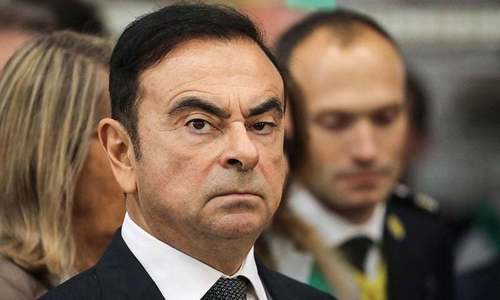TOKYO: New reports emerged on Monday on how fugitive former Nissan boss Carlos Ghosn jumped bail in Japan, as the country’s justice minister said border controls would be bolstered after the escape.
The 65-year-old executive skipped bail nearly a week ago, fleeing Japan where he was awaiting trial on multiple counts of financial misconduct that he denies.
The details of his escape remain spotty, with Japan saying it is still investigating how he slipped past strict security measures imposed as part of his bail conditions.
Citing sources close to the investigation, public broadcaster NHK said that Ghosn left his residence by himself on the afternoon of December 29 and met two men at a Tokyo hotel.
The three then boarded a “shinkansen” bullet train together from Tokyo’s Shinagawa station to a station in western Osaka, arriving around 7:30pm.
The trio then checked in at a hotel near Kansai Airport, but only the two men accompanying Ghosn were caught on security camera leaving the hotel later in the evening, NHK said.
They were carrying “two big boxes” which were not checked by customs staff at the airport, the report added.
Ghosn is believed to have taken a private jet from the airport that evening, bound for Istanbul, where he switched planes and continued to Beirut.
But many details of his departure from Japan are still shrouded in mystery. The justice ministry said it did not have records of Ghosn departing Japan.
“It is believed that he used some wrongful methods to illegally leave the country,” Justice Minister Masako Mori said at a press conference on Monday.
“I have instructed the immigration agency to further tighten the departure process,” she added.
The Wall Street Journal has reported that Ghosn was loaded onto the flight from Osaka in a large case for audio equipment, which was later found at the back of the cabin.
The newspaper cited unnamed sources close to the investigation in Turkey as saying that holes had been drilled into the bottom of the container to ensure the businessman could breathe.
Japan’s transport ministry said that luggage checks are not mandatory for private jets.
“Operators of private jets decide if luggage checks are necessary or not while airline operators are obliged to conduct security checks under Japan’s aviation law,” a ministry official said.
“The security checks are carried out to prevent danger such as bombs, and to prevent hijacks,” he said, adding such risks are considered less likely for private jets.
Ghosn, who has French, Brazilian and Lebanese nationalities, was able to enter Lebanon on a French passport, according to airport documents.
A court in Tokyo had allowed Ghosn to keep a second French passport as he needed one to travel inside Japan, a source close to the matter has said.
Japan has launched a probe into the humiliating security lapse and prosecutors said they would “coordinate with the relevant agencies to swiftly and appropriately investigate the matter.” Ghosn has vowed to give his own account at a hotly awaited press conference in Beirut this week.
Published in Dawn, January 7th, 2020
















































Dear visitor, the comments section is undergoing an overhaul and will return soon.